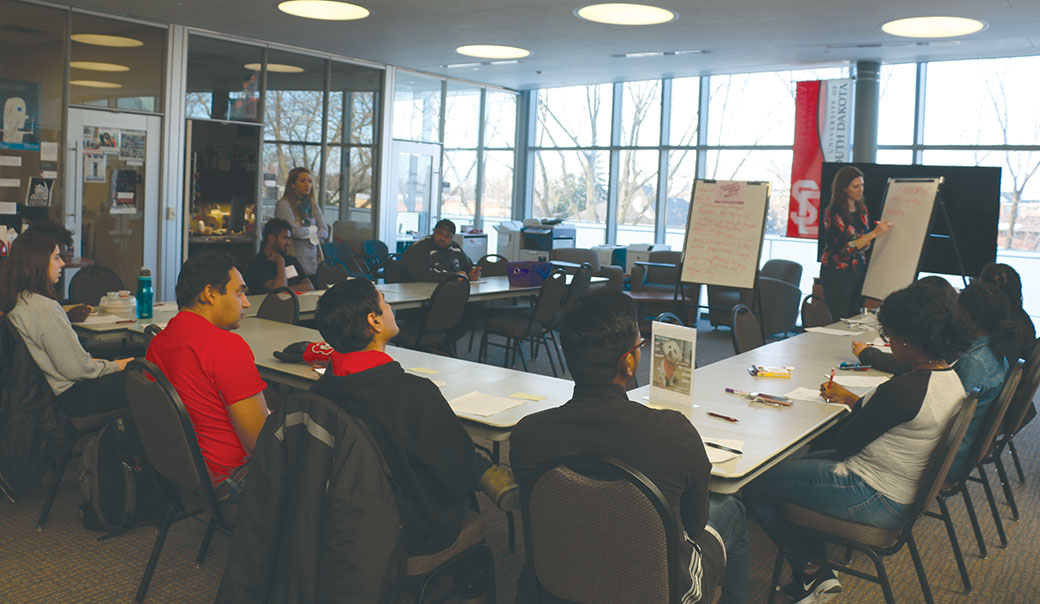
USD Women’s (Her)story Month focuses on feminism, education
March is more than just a month for clovers and leprechauns, it’s also the official month for women’s history. USD is hosting multiple events to showcase women’s history.
The kick-off event on March 1 was a social event called “Who Runs the World? Girls!” hosted by co-founders of the Sampson House, a marketing agency in Sioux Falls. Next was “Expressions of Identity Workshop and Film,” hosted by Sara Lampert, an assistant history professor.
Lampert said Women’s (Her)story Month can be used to create a dialogue about how history is often focused on the accomplishments of men.
“One of the critiques of the early women’s history scholars is that history is often ‘his’ story instead of ‘her’ story,” Lampert said. “So that has become a kind of colloquialism for thinking about what it means when we very consciously reorient our focus on women. Women’s lives, women’s stories, women’s experiences.”
Lena Tran, USD’s intercultural program coordinator, said the Center for Diversity & Community went with the direction of
(Her)story to highlight women’s stories, contributions to society, as well as their struggles in fighting for equal rights.
The month represents a deep appreciation, pride and what it means to be a woman, Tran said.
“I think of my mother as a Vietnamese refugee having to sacrifice everything for her family. She doesn’t have a high school degree, but what she has is the love of a mother,” Tran said. “She has given up so much and I think about where I am as a professional, to be able to be going for my graduate studies and advanced degrees. That shows how much gratitude I have to be able to say that I can be an educated woman in society and have an opportunity of a career.”
As a women’s historian, Lampert said she focuses on women’s history all year. She would like to think historians across all fields are doing the same thing in their classes, she added.
“I think that focusing on women’s lives and experiences and focusing on history through an analysis of gender continues to be really important,” she said. “I think women’s history is a celebration and a reminder to keep women in the story.”
During her workshop, Lampert talked with students about feminism and the misperceptions society has towards it. A film called “Wonder Women: The Untold Story of American Super Heroines” was shown at the end of the workshop. About 10 students attended the event.
First-year accounting major Sophia Lima attended, and said it gave her a new perspective on the issues.
“One of my favorite parts when she was answering our questions, she was very honest about not having the answer to all these problems in the world,” Lima said. “With your professors, they’re not here to just give you solutions, but to help you develop a skill set and provide you with tools so that you can go out and find solutions. That’s so much more valuable.”
Tran said representation matters because it gives people someone to look up to.
“I remember watching Disney’s ‘The Suite Life of Zack and Cody,’ Brenda Song was my idol,” she said. “That made a huge impact on my life and one might not realize it, but to have representation in the media, it matters. It inspires us and it motivates us.”
It’s important to celebrate women’s history every day and to keep the momentum going, Tran said.
“We have to continue to inspire, we have to communicate and make it part of our daily dialogue,” she said. “It matters because we all have women in our lives that have made a difference in our lives.”
Lampert said her mother influenced her to become a historian and be interested in women in the arts.
Her mother had applied to an art program, but was rejected. She decided to put her artwork up anyway, which people became interested in, but they assumed it was done by a man. After she revealed herself, she was asked to reapply to the program.
“She really introduced me to some of the critiques of gender hierarchy in our culture that came out of second-wave feminism,” Lampert said. “Like the way we devalue or marginalize or ignore women’s voices, stories and experiences, or assume that something is less inherently interesting if it’s about or by a woman.”
Lampert said something that’s become very important in recent years in terms of feminism critiques, fights for equality and fights for LGBTQ+ equality is the fight for transgender rights. She said it’s important to her as a feminist that she be an ally for people different from her who are struggling for inclusion and acceptance.
“Women’s history is both about foregrounding the history of stories and experiences of women and girls and it’s about using the critiques of feminism to support our continuing work for gender equality,” Lampert said.
The Cultures of Change Conference will be held on March 22 in the Muenster University Center and a race & civility visit with Elizabeth Acevedo on April 6.
Lima didn’t know much about Women’s History Month until this year at USD, she said.
“I think that’s one of the great parts about the CDC,” she said. “It really gives students the opportunity to be a lot more aware of their surroundings and communities.”
Women’s History Month is a means of recognizing that it took a lot of work to get to where women are today, but also serves as a reminder that society isn’t done yet, Lima said.
Tran said that women’s history isn’t a checklist and that it’s not linear.
“It’s a continuous life learning because we are always evolving and changing. Women’s issues today are not always going to be the same as back in the ‘50s or ‘60s,” Tran said. “We have to continue to educate ourselves and be updated. Show partnership and allyship of support, too.”

